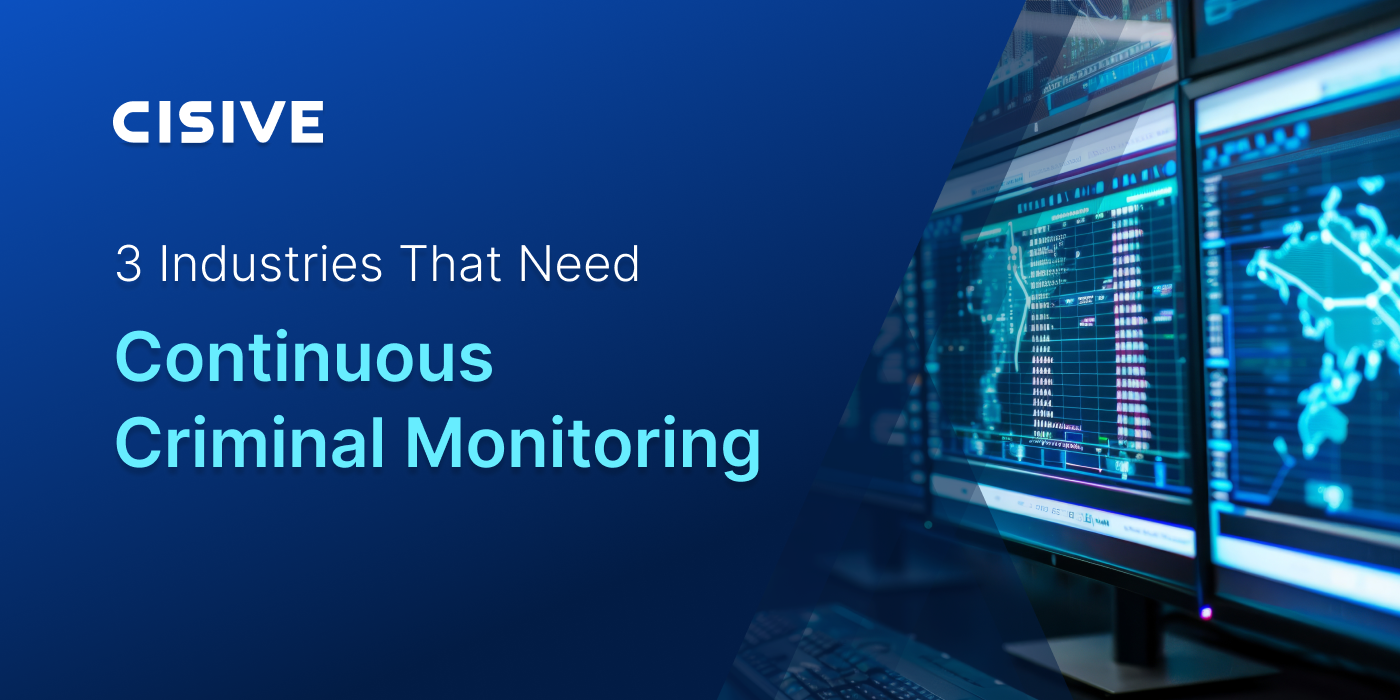

The COVID-19 pandemic catalyzed a significant shift in the professional landscape, ushering in the...

Many employers understand the value in conducting a pre-employment background check. They know that screening an applicant for a history of criminal behavior helps identify individuals whose past behavior represents possible risk in the workplace.
What risk is posed by the individuals who are hired though? Does the possibility for a criminal record to be incurred suddenly stop once employed? What responsibility does an employer have to understand the criminal history of an employee after hire?
Periodically rescreening your employee population with a full set of searches can be an important part of a screening program, but is probably not financially realistic to perform on an ongoing basis.
Given that, how long would an employee be working before a conviction was uncovered? One year? Two years? What can you do to ensure a quicker alert to criminal behavior of your current employees?
The answer is Continuous Criminal Monitoring (CCM). Instead of finding a criminal record years after an event, employers can now be notified in near real-time after the offense is committed.
The employer provides Cisive with a list of employees to be monitored on an ongoing basis. The 24/7 monitoring service will scan employees and alert Cisive to criminal activity in near-real time.
Cisive will research to determine whether there is a criminal record belonging to an employee under monitoring. Cisive only reports to clients actionable data. This means an employer can consult with their own legal team about the data.
These results are reported through the client’s portal in Cisive and are separate from the pre-employment background checks. This allows clients to authorize separate access only to the individuals who need it.
Employers who may be the most interested in Continuous Criminal Monitoring may have employees engaged in the following job duties:

The movement of goods is the lifeblood of commerce and this vital industry must protect itself from theft and fraud while ensuring regulatory compliance. Continuous Criminal Monitoring serves as a proactive measure to mitigate risks, protect assets, and increase compliance.
By monitoring employees for criminal activity, transportation companies can minimize the likelihood of widespread cargo theft or fraudulent activities, thus safeguarding valuable assets and reducing financial losses.
Regulatory compliance is a cornerstone of the transportation industry, with stringent rules governing driver qualifications, vehicle safety, and cargo handling. Implementing criminal monitoring helps ensure that employees will continue to meet legal requirements and adhere to industry standards, thereby mitigating the risk of non-compliance penalties and reputational damage.
Beyond financial considerations, employee criminal monitoring enhances safety within the transportation industry. Identifying individuals who commit offenses related to their driving or substance abuse allows companies to make informed staffing decisions. This promotes a culture of responsibility and reduces the likelihood of accidents.

In the financial sector, trust and integrity are paramount, underpinning the stability of markets and the confidence of investors. Employee criminal monitoring plays a crucial role in upholding these principles and safeguarding against fraudulent activities and breaches of trust.
Financial institutions are prime targets for various forms of financial crimes, including money laundering, embezzlement, and identity theft. With ongoing monitoring of employees, firms can identify individuals who might be at risk to commit financial misconduct, thereby reducing the risk of internal fraud and protecting the interests of clients and stakeholders.
The financial industry operates within a complex regulatory framework, with stringent requirements aimed at combating illicit financial activities and ensuring transparency. Employee criminal monitoring reduces the chance that a current employee will be unable to meet the periodic regulated rescreens such as FINRA Broker Sanctions and Financial Anomalies Search Technology (FAST).
Reputation is a cornerstone of success in the financial sector, influencing client retention, investor confidence, and market perception. By proactively monitoring employees for criminal activity, financial institutions demonstrate their commitment to integrity and risk mitigation, safeguarding their reputation and preserving trust in the eyes of stakeholders.

In the healthcare sector, the protection of patients' well-being and sensitive information is paramount. Employee criminal monitoring serves as a critical safeguard against potential threats to patient safety, data security, and regulatory compliance.
Healthcare facilities are entrusted with the health and welfare of patients, making the integrity of the workforce a top priority. By monitoring employees for criminal activity, organizations can stop individuals who have committed abuse, violence, or negligence, thereby reducing the risk of harm to patients and ensuring a safe care environment.
With the widespread digitization of medical records and the increasing prevalence of cyber threats, safeguarding patient data has become a pressing concern for healthcare organizations. Employee criminal monitoring helps mitigate the risk of data breaches by identifying individuals convicted of identity theft, fraud, or unauthorized access, thereby bolstering the security of sensitive information and ensuring compliance with privacy regulations such as HIPAA.
The healthcare industry is subject to stringent ethical standards and regulatory requirements aimed at protecting patient rights and ensuring quality of care. With ongoing employee screening, healthcare providers demonstrate their commitment to compliance with laws and ethical principles, fostering trust among patients and regulatory bodies alike.
Employee criminal monitoring offers a proactive approach to risk mitigation and integrity maintenance for critical/sensitive positions with any employer and all employees within key industries such as transportation, finance, and healthcare.
By identifying individuals who have committed misconduct, organizations can safeguard assets, uphold ethical standards, and protect the interests of stakeholders. As the regulatory landscape evolves and threats continue to evolve, investing in robust monitoring programs is an essential component to ensure the security, integrity, and resilience of organizations in today's dynamic business environment.
Speak to an expert today to discuss implementing continuous criminal monitoring at your organization.
Author: Cisive Staff
Bio: Contributed by a member of our staff with expertise in background screening for highly regulated industries.
Let's Connect on LinkedIn
The COVID-19 pandemic catalyzed a significant shift in the professional landscape, ushering in the...

The biggest threat to your organization might already be on the payroll. Nearly 70% of...

Background checks rarely make headlines, until they miss something critical. Imagine onboarding a...